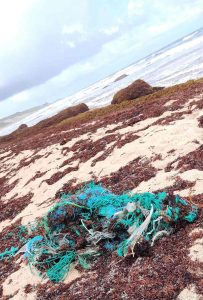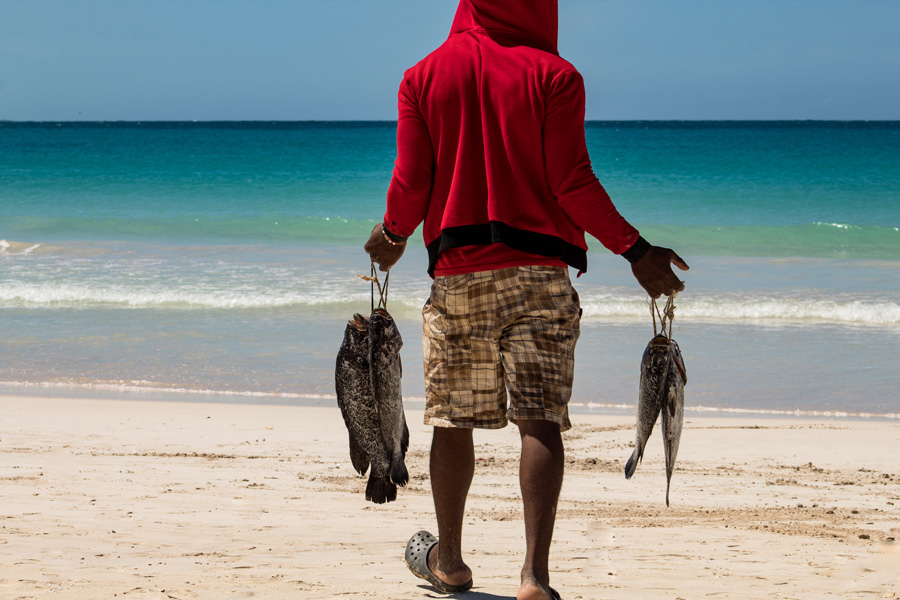Parachute science and Caribbean plastic pollution
Marine litter research in the Caribbean’s Small Island Developing States (SIDS) is imperative for protecting local communities and ecosystems from the effects of plastic pollution. Work to resolve the damage caused by marine debris, however, is being undermined by ‘parachute science’, where scientists from outside SIDS conduct research and leave without consulting or collaborating with local experts. Dr Aleke Stöfen-O’Brien and her colleagues from the World Maritime University, Sweden, are tackling this important issue to promote more equitable and sustainable ocean governance and international scientific collaboration.
Marine litter and plastic pollution threaten the ecological and socioeconomic stability of Small Island Developing States (SIDS) in the Wider Caribbean (WC) region. Precious marine ecosystems are being polluted with plastic waste from localised sources as well as ocean currents, which concentrate drifting litter on to the pristine coastal and marine ecosystem. This poses a serious threat to SIDS, which are highly dependent on the ocean for food security and employment (fishing and catering industries), recreation (beaches and water sports), and tourism (diving and cruise industries). This high dependency on marine ecosystems comes at a price, however, when land resources are limited and population densities are high.
Global markers of change
The 16 SIDS comprising the WC are Antigua and Barbuda, the Bahamas, Barbados, Belize, Cuba, Dominica, Dominican Republic, Grenada, Guyana, Haiti, Jamaica, St Kitts and Nevis, St Lucia, St Vincent and the Grenadines, Suriname, and Trinidad and Tobago. Each of these states experiences disproportionate quantities of marine debris, with an estimated marine litter density in the Caribbean three times the global average. Some of this excess plastic pollution results from the SIDS being located on the edge of ocean gyres and wind belts, which concentrate marine debris on and near to the islands. Despite a lack of verified data and knowledge, it may be assumed that most of the remainder comes from land-based waste.

Untold problems – parachute science
In a new research paper, Dr Aleke Stöfen-O’Brien from the World Maritime University, Sweden, and her colleagues Kristal Ambrose, Tricia Lovell, Kristie Alleyne, and Roxanne Graham, address the serious threat of marine litter to ensure the long-term environmental and economic prosperity of SIDS. They also raise a second, very important issue: parachute science, a term that refers to scientists from other, mainly developed, countries conducting research in a particular geographic location without the engagement and consultation of local experts, researchers, or decision-makers.
In the WC context, this is a significant flaw in current research activities. Each of the island territories and states comprising the WC is unique, and local populations and wildlife use the resources of the marine environment in nuanced ways. Scientists arriving from outside the Caribbean are often not connected with local networks or do not think to engage with valuable local knowledge and expertise which could contribute to targeted and needs-based solutions to the challenges faced by these islands. Yet, argue the researchers, effective sustainable ocean governance will only be possible if the conduct of scientific research itself is equitable and fair.
Historical marine litter research
Past research has relied upon eminent experts in their field collaborating with national and international agencies to implement regional and national management strategies for plastic pollution – for example, monitoring the amount of plastic litter on beaches and in the water column, animals, plants, and sediments. Most previous research has also focused on plastic pollution in Europe, so the management strategies they produce cannot simply be translated to the Caribbean. Tailor-made solutions are needed.

Stöfen-O’Brien and her co-authors believe the parachute science problem has been enhanced by the scarcity of local funding available for research. Equipment and research infrastructure are expensive and must compete with other complex environmental and social challenges that impact SIDS, including climate change and extreme weather events. To find that funding, a shift in research policy is needed to recognise the importance of local scientists’ work, not just for its potential impact on their own communities but for its relevance to policymakers, who might then divert more funding towards further research.
SIDS experience disproportionate quantities of marine debris, with an estimated marine litter density three times the global average.
Impacts of scientific inequity
Marine debris research on the SIDS is rarely published and when it is, it typically isn’t led by Caribbean scientists. When the authors assessed current scientific literature focused on the 16 SIDS in the region, they found that 65% of papers published on the plastic pollution issue were not led by authors from the SIDS of the Eastern Caribbean region. This isn’t just an issue of equity; governments rely on robust science to inform their policymaking, so that science needs to directly reflect the experience of those islands facing some of the greatest quantities of marine litter in the world.
As equity and justice increasingly become part of society’s conscience, how can this be translated to benefit SIDS? As a start, we need to fill the gaps in our scientific knowledge relating to the sources and distribution of marine litter in the Caribbean. A number of organisations have developed guidance and policies related to scientific monitoring of marine plastic: the UN Environment Caribbean Programme, Global Partnership for Marine Litter-Caribbean, Gulf and Caribbean Fisheries Institute, and the International Union for the Conservation of Nature (IUCN)’s Plastic Waste Free Islands Initiative are all steps in the right direction.
It’s a promising start, but the authors believe a more cohesive approach to local initiatives is also needed. Encouraging local populations to monitor their coastlines and marine environments would also benefit from formal programmes that provide funding for non-governmental organisations (NGOs) to work alongside volunteers and citizen science projects. While voluntary monitoring and clean-ups are extremely valuable, a long-term, consistent monitoring approach is needed to truly understand the scale of the marine litter problem facing the SIDS. This requires an active effort to involve local populations with research activities and effective knowledge sharing.

Addressing parachute science
What factors need to be addressed to reverse parachute science and create tailor-made solutions for marine debris in SIDS? The authors highlight that research providers (such as fishery advisory committees, national coordination committees, and ministerial councils) rely on research conducted by universities, marine laboratories, and NGOs, as well as private sector, regional, and national agencies. Many people are involved in generating and using scientific research to inform policy. However, it should be recognised that the scientists conducting the research are often funded by external parties, which means there may be political or international policy constraints that influence what research is conducted. Consequently, scientific understanding being generated by researchers from outside the Caribbean may not have the greatest benefit for SIDS.
However, there are actions being taken to address parachute science. The UN 2030 Sustainable Agenda requires that every country possesses the science and technology necessary to allow it to address the specific needs of that country. This policy specifically targets SIDS and the least developed countries, with the aim of enhancing research capacity in these areas to improve ocean health. Successful ocean governance relies on understanding the research agendas of scientists and decision-makers alike. Similarly, the UN Decade of Ocean Science for Sustainable Development (2021–2030) aims to improve interdisciplinary marine research in SIDS and developing countries so that local populations and policymakers can better understand the stresses and find sustainable solutions to marine litter. More generally, the UN Environment Programme has also identified that research priorities must address categories such as gender, age, and marginalised groups, to ensure that scientific research and its findings are equitable and just.
Successful ocean governance then, according to the authors, relies on understanding the research agendas of scientists and decision-makers alike.

Sustainable marine debris solutions
The issue of parachute science and the associated questions of equity and justice need to stand central in the current efforts towards the negotiation of an International Plastic Treaty. Recently, there has been a collaborative effort to determine what action needs to be taken to reduce marine litter in the Caribbean. For example, from a practical perspective, as SIDS are highly dependent on tourism, their solid-waste management systems need to be improved to cope with rising tourist numbers.
From a research perspective the researchers suggest that best practice for mitigating parachute science should include the involvement of local scientists and institutions before research begins, to promote collaboration and the mutual exchange of information. This means local researchers gain access to the latest global advances in the field, while international collaborators benefit from a deeper understanding of the specific issues that impact SIDS.
Decision-makers should also have an input into the research to make sure it aligns with local priorities and addresses the issues of most importance to islands within the WC. Stöfen-O’Brien and her colleagues also highlight the need for better knowledge-sharing between geographically dispersed SIDS, to combat the divide between the Global North and South, as well as for South–South information sharing.
To achieve equity and justice in science, it is imperative that research is conducted in the WC region by, and with, the expertise of researchers and also of citizens. A one-size-fits-all approach to marine debris policy just won’t work for all the regions experiencing this issue, nor will it work for research. Scientists play a valuable role in decision- and policy-making, and the authors’ work highlights that combating parachute science is paramount for fair and sustainable ocean governance.
Personal Response
How can scientists and institutions of the Global North best support local experts without ‘parachuting in’?
The scientists and institutions of the Global North may not be aware that they are indeed practicing parachute science. A starting point is to create awareness among scientists and institutions that their conduct of research may contribute to inequality issues. The researchers also have to recognise that different knowledge systems occur in different parts of the world. Therefore, conducting research on preconceived ideas (largely based on colonial science) may not be to their advantage and certainly not to the country or community under study.
Education and awareness-raising on this may be streamlined through education or put on the agenda of science meetings, by way of example. On the other hand, this may also be addressed from a more structural manner. For any funding of scientific research endeavours in countries of the Global South, there may be a parameter that meaningful engagement with local expertise must be sought and effectively implemented. Every effort should be made to achieve meaningful engagement instead of box-ticking.